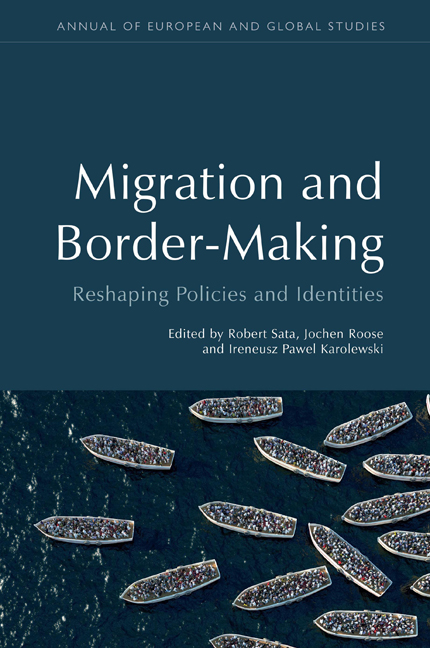Book contents
- Frontmatter
- Contents
- List of Contributors
- Introduction: Patterns and Implications of Migration and Rebordering
- 1 Do Migrants Think Differently about Migration? An Experimentum Crucis for Explaining Attitudes on Migration
- 2 Fencing in the Boundaries of the Community: Migration, Nationalism and Populism in Hungary
- 3 Rethinking Refugee Integration: The Importance of Core Values for Cultural Debate in Germany
- 4 The Unfolding of the Syrian Refugee Crisis in Turkey: From Temporariness to Permanency
- 5 The Middle Eastern Refugee Crisis and the So-Called Islamic State: Motivations of Iraqi Yazidis for Migrating to Europe
- 6 Current Migration Trends in Russia: The Role of the CIS Region Twenty Years after the Collapse of the Soviet Union
- 7 The North Amazon Border: Haitian Flow to Brazil and New Policies
- 8 Macedonian Refugees from the Greek Civil War: From Separation to a Transnational Community
- Index
Introduction: Patterns and Implications of Migration and Rebordering
Published online by Cambridge University Press: 08 October 2020
- Frontmatter
- Contents
- List of Contributors
- Introduction: Patterns and Implications of Migration and Rebordering
- 1 Do Migrants Think Differently about Migration? An Experimentum Crucis for Explaining Attitudes on Migration
- 2 Fencing in the Boundaries of the Community: Migration, Nationalism and Populism in Hungary
- 3 Rethinking Refugee Integration: The Importance of Core Values for Cultural Debate in Germany
- 4 The Unfolding of the Syrian Refugee Crisis in Turkey: From Temporariness to Permanency
- 5 The Middle Eastern Refugee Crisis and the So-Called Islamic State: Motivations of Iraqi Yazidis for Migrating to Europe
- 6 Current Migration Trends in Russia: The Role of the CIS Region Twenty Years after the Collapse of the Soviet Union
- 7 The North Amazon Border: Haitian Flow to Brazil and New Policies
- 8 Macedonian Refugees from the Greek Civil War: From Separation to a Transnational Community
- Index
Summary
A world on the move
MIGRATION IS CURRENTLY changing the world, in particular social interactions and political processes across nationally bounded societies. Certainly, in all periods, people have been on the move and this has changed societies constantly, even though to a varying degree. Sometimes people would come as refugees, workers, merchants or guests, at other times as enemies, invaders or destroyers. Frequently, these encounters between strangers led to change generating innovation; sometimes the encounter was to their mutual benefit, but at other times conflict was born, the latter probably more oft en than not. With the establishment of modern statehood came political attempts to regulate migration and to control borders, and more recently, to discourage people from coming. Seen from a historical perspective, the current trends of migration and attempts at migration control are nothing new. However, migration has had its own constellations, its pressures and its trends, evolved over the years together with the different migration regimes enabling and restricting migration to varying degrees. This is why migration patterns at any time deserve particular attention and a sound analysis, since they have various socio-political implications. In this sense, exploring constellations of migration and a variety of migration regulation regimes can inform us not only about ongoing changes that can be expected in societies, but also about how far the current migration situation is imprinted by the past.
Currently, migration has become a central focus of European societies, as the ‘refugee crisis’ has been dominating the continental political agenda since 2015. While people from Syria, Iraq, Afghanistan and various places in Africa keep arriving in the southern member states of the EU, the EU itself has been deeply conflicted about how to deal with mass migration from the Global South. Despite the current focus on European mass migrations, refugee flows and new boundaries have not been an exclusively European phenomenon, as for instance Africa and South America have been subject to regional migration flows as well, oft en to an even higher degree than Europe. In the USA, Donald Trump won the 2016 presidential election probably largely due to the promise of building a wall against migrants from the South.
- Type
- Chapter
- Information
- Transnational Migration and Border-MakingReshaping Policies and Identities, pp. 1 - 33Publisher: Edinburgh University PressPrint publication year: 2020



